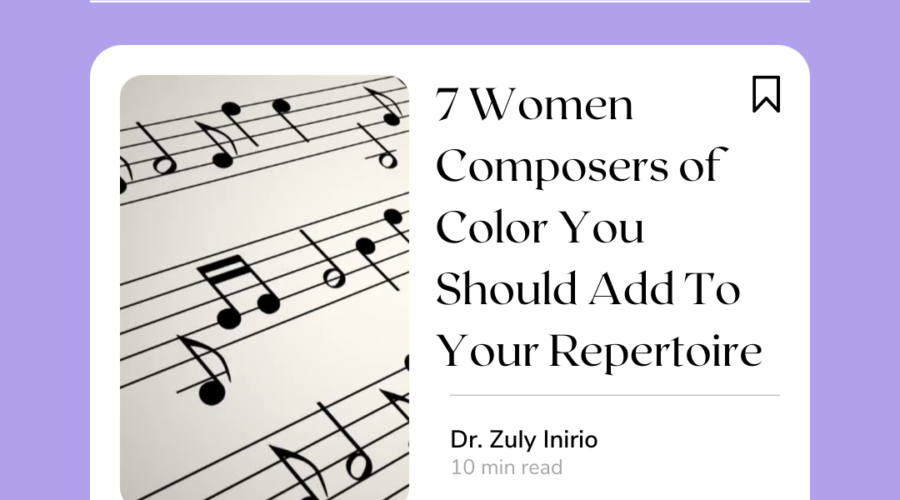7 Women Composers of Color You Should Add To Your Repertoire By BTAR Zuly Inirio
1. Jessie Montgomery (b. 1981) Jessie Montgomery is a violinist, composer, and music educator from New York City. She performs and gives workshops in the US and abroad and her compositions are being performed by orchestras and chamber groups throughout the country. Jessie began her violin studies, at the Third Street Music School Settlement, one of the oldest community organizations in the country. Upon graduating with her Bachelor’s degree from the Juilliard School in Violin Performance in 2003, she joined forces with Community MusicWorks in Providence, Rhode Island, a nationally recognized leader in community development and music education. Most recently she has become a collaborator with Yo-Yo Ma’s Silkroad Ensemble and toured with them in the 2018-19 season. Since 1999, Jessie has been affiliated with The Sphinx Organization, which supports the accomplishments of young African-American and Latino string players. Jessie was also Composer-in-Residence with the Sphinx Virtuosi, a conductor-less string orchestra that toured her music for 3 seasons. In 2012, Jessie completed her graduate degree in Composition for Film and Multimedia at New York University, at which point composing became a true focus on her path.
2. Gabriela Lena Frank- (b. 1972) Currently serving as Composer-in-Residence with the storied Philadelphia Orchestra and included in the Washington Post’s list of the 35 most significant women composers in history (August 2017), identity has always been at the center of composer/pianist Gabriela Lena Frank’s music. Born in Berkeley, California, to a mother of mixed Peruvian/Chinese ancestry and a father of Lithuanian/Jewish descent, Gabriela explores her multicultural heritage through her compositions. Inspired by the works of Bela Bartók and Alberto Ginastera, Gabriela has traveled extensively throughout South America in creative exploration. Her music often reflects not only her own personal experience as a multi-racial Latina, but also refracts her studies of Latin American cultures, incorporating poetry, mythology, and native musical styles into a western classical framework that is uniquely her own.
3. Tania León- (b. 1943) born in Havana, Cuba, is highly regarded as a composer, conductor, educator, and advisor to arts organizations. In 2021, her orchestral work Stride (2020), commissioned by the New York Philharmonic, was awarded the Pulitzer Prize in Music. Recent commissions include works for New York Philharmonic, Los Angeles Philharmonic, NDR Symphony Orchestra, Grossman Ensemble, and International Contemporary Ensemble. Appearances as guest conductor include Philharmonic Orchestra of Marseille, Gewandhausorchester, Orquesta Sinfonica de Guanajuato, and Orquesta Sinfónica de Cuba. Her works include the opera Scourge of Hyacinths (1999) and vocal works Pueblo Mulato (1987), Ivo Ivo (2000), and Atwood Songs (2007).
4. Dai Wei- is originally from China. Her musical journey navigates the spaces between east and west, classical and pop, electronic and acoustic, innovation and tradition. She often draws from eastern philosophy and aesthetics to create works with contemporary resonance, and reflect an introspection on how these multidimensional conflict and tension can create and inhabit worlds of their own. Her artistry is nourished by the Asian and Chinese Ethnic cultures in many different ways. Being an experimental vocalist, she performs herself as a Khoomei throat singer in her recent compositions, which are filtered by different experiences and backgrounds as a calling that transcends genres, races, and labels. Wei is currently pursuing her doctorate in Music Composition at Princeton University as a Naumburg Fellow. She holds Artist Diploma at the Curtis Institute of Music, where she studies with Jennifer Higdon, David Ludwig, and Richard Danielpour.
5. Kamala Sankaram- (b. 1978) Praised as “one of the most exciting opera composers in the country” (Washington Post), composer Kamala Sankaram moves freely between the worlds of experimental music and contemporary opera. Recent commissions include works for The Glimmerglass Festival, Washington National Opera, the PROTOTYPE Festival, and Creative Time, among others. Kamala is known for her operas fusing Indian classical music with the operatic form, including Thumbprint, A Rose, Monkey, and Francine in the City of Tigers, and the forthcoming Jungle Book. Also known for her work pushing the boundaries of the operatic form, recent works include The Last Stand, a 10-hour opera created for the trees of Prospect Park, Brooklyn, Only You Will Recognize the Signal, a serial space opera performed live over the internet, Looking at You, a techno-noir featuring live data mining of the audience and a chorus of 25 singing tablet computers, all decisions will be made by consensus, a short absurdist opera performed live over Zoom, and The Parksville Murders, the world’s first virtual reality opera.
6. Arlene Sierra- (b. 1970) is a London-based American composer whose music is lauded for its “highly flexible and distinctive style” (The Guardian), ranging from “exquisiteness and restrained power” to “combative and utterly compelling” (Gramophone). Notable premieres include Nature Symphony “memorable for its creation of wonderful sounds from a large orchestra” (Bachtrack.com) commissioned by BBC Radio 3 and the BBC Philharmonic, Butterflies Remember a Mountain for the Benedetti-Elschenbroich-Grynyuk Trio, described as “precisely and joyously imagined” (The Times, London) and performed in venues including the Concertgebouw and the BBC Proms, and a New York Philharmonic commission for chamber orchestra Game of Attrition, described by Time Out as “at turns spry, savage, sly and seductive… so enrapturing.” Sierra’s highly individual works have been nominated and awarded on several occasions, having garnered her the prestigious Toru Takemitsu Composition Prize, a Charles Ives Fellowship from the American Academy of Arts and Letters, PRS Composers Fund and Women Make Music awards, and a Leverhulme Fellowship. Her orchestral showpiece Moler was nominated for a Latin Grammy for Best Contemporary Classical Composition.
7. Dawn Avery- is a Native American composer, cellist, vocalist, and educator. Avery has worked with a wide range of musicians and is active in indigenous language preservation and cultural preservation, both as a musician and as a professor, and through leading workshops and participating in traditional ceremonies. Described as, part of a, “dramatic increase,” in American Indian art music in the 1990s, Her own music spans from traditional Mohawk and classical music, including orchestral music, to non-art genres such as downtempo. She is number three on Hirschfelder and Molin’s “Thirteen Native Classical Musicians” list. Avery’s works are diverse as she explores various different genres. In an interview with Suzanne Gilchrest of 8 Strings and a Whistle, Avery proclaimed that she has been influenced by classical music, world music, rock, and jazz; in addition, she specifically named musicians, including Ludwig van Beethoven, Coltrane, Pink Floyd, Johnny Whitehorse, Sting, and many others. Avery’s music can be heard in several award-winning films, including Basquiat, the Smithsonian’s artwork Always Becoming by Nora Naranjo-Morse, several Rich-Heape Films, and the movie Tadpole. Her most recent project and recording 50 Shades of Red features music, dance, film, and ritual. Tara Gatewood of Native America Calling said this downtempo work is a new genre in Native American music.
Who is your favorite Composer of Color? Are they included in our list? Let us know in the comments below!







